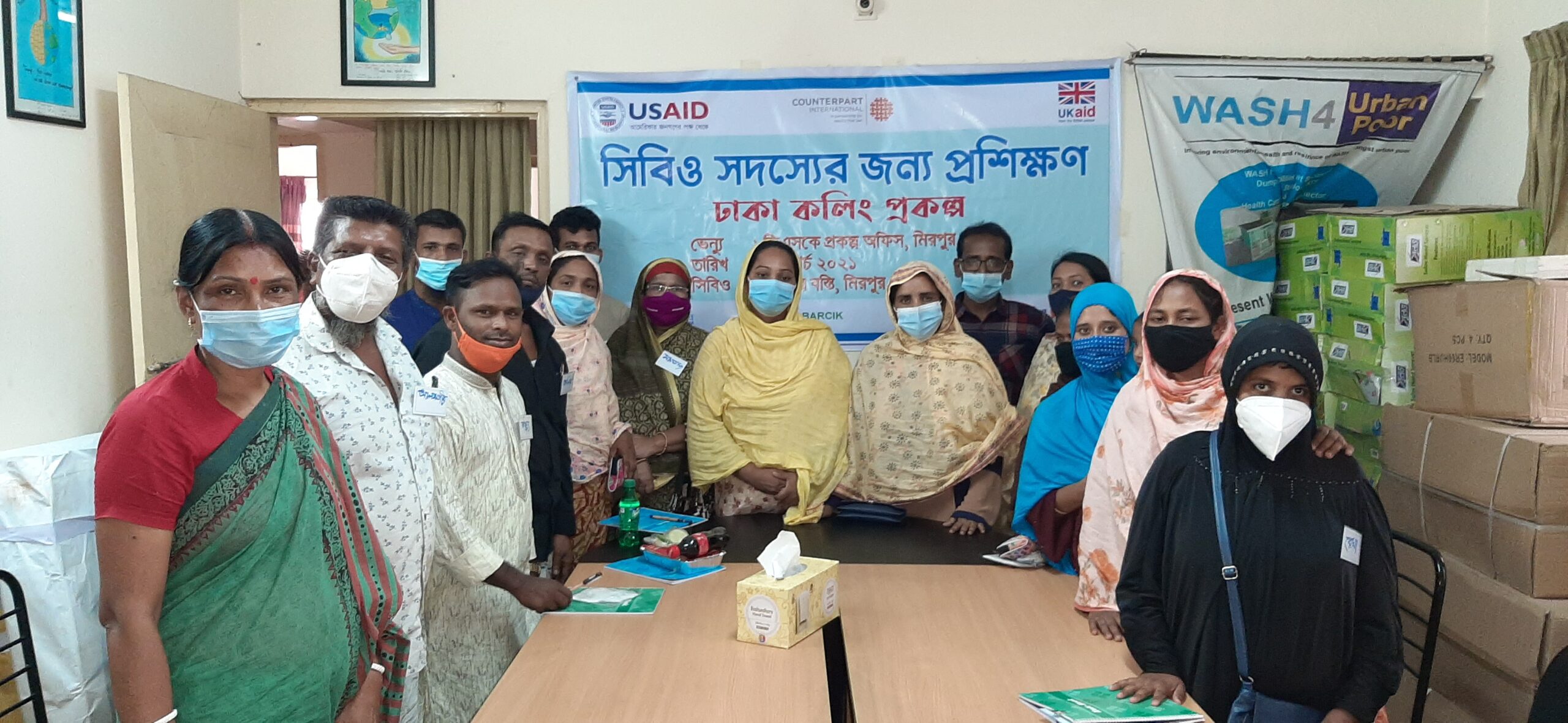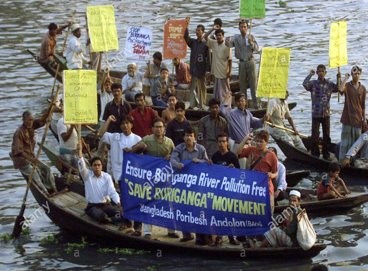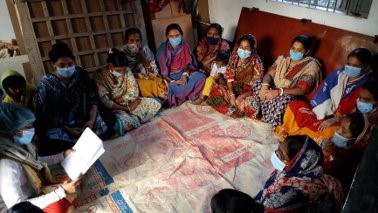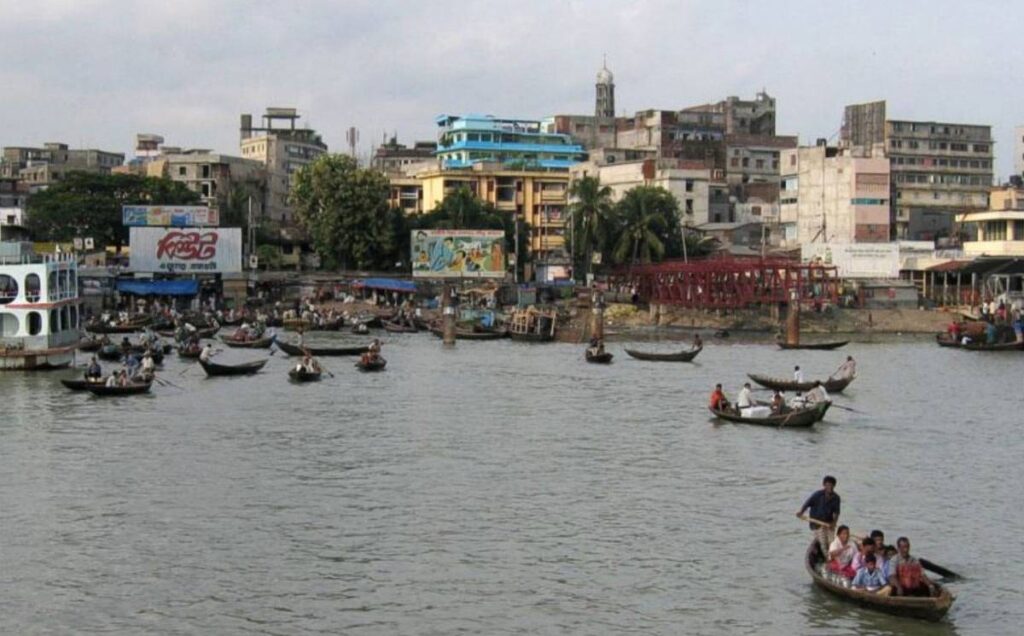By: Rebecca Askin, Senior Manager – Evidence, Learning, and Impact
Rebecca Giovannozzi, Program Officer
Counterpart International implements the USAID and FCDO co-funded Promoting Advocacy and Rights (PAR) activity in Bangladesh. Throughout this five-year project, we have supported local civil society organizations (CSOs) through technical assistance and grantmaking to ensure they are able to effectively advocate for citizen priorities.
The Digital Security Act of 2018, revisions to the Volunteer Social Welfare Organizations Act in 2019, and recent amendments to the 2017 National Online Media Policy in August of 2020 in Bangladesh are causing civil society actors to raise concerns about state-led repression.
In this political environment, Bangladeshi CSOs have faced challenges in their efforts to promote and advocate for good governance – or “shuśhāsan” in Bangla. Communities coming together to collectively identify and prioritize their shared concerns is important for the foundation of advocacy efforts that aim to address policy gaps, issues of policy implementation, and lack of political will.
Counterpart’s Promoting Advocacy and Rights (PAR) project supports CSOs in their efforts to analyze and respond to governance challenges, and partners with the International Center for Not for Profit Law – experts in international legal frameworks – to educate CSOs about the laws that affect their ability to operate in Bangladesh and promote civil society to increase responsive policymaking and policy implementation by the Government of Bangladesh.
The PAR project hosted citizen engagement fora (CEFs), a multi-stakeholder dialogue mechanism that Counterpart frequently uses to engage community members in discussing issues, priorities, and needs. CEFs were held in 18 districts over two months to support CSOs, activists, and other stakeholders to identify and prioritize issues of common concern in their communities that are not adequately addressed by government authorities. Through this process, drug abuse, gender-based violence (GBV), environmental pollution, and unplanned urbanization were identified as the focus for CSOs’ advocacy efforts. Counterpart recognized the CSO contributors to our CEFs had long-standing expertise in these priority issue areas and wanted to further support them through grants to advocate on behalf of their communities.
-

One consortium is led by Waterkeepers Bangladesh, which is working to address environmental pollution policy affecting Dhaka’s river system. -

Waterkeepers Bangladesh -

Another consortium is led by Dushtha Shasthya Kendra, which is working to address environmental pollution policy affecting urban slums in Dhaka.
Advocacy results after one year
The first grants supported consortiums working on drug abuse and GBV advocacy efforts. A year into these grants, we held “Review and Refresh” sessions with the consortiums to reflect on their current activities, discuss governance and legal barriers, and pivot from primarily community awareness raising to policy advocacy engagement with government, law enforcement, and religious authorities.
Taking time to co-create
So why use co-creation as a granting mechanism to fund consortiums working in environmental pollution and unplanned urbanization? In the third year of the project, we re-oriented the project because there were no long-term results from the project’s advocacy trainings. The shift in project scope is meant to ensure that CSOs can show sustainable advocacy successes and be fully supported in the oncoming years. We decided to use a co-creation approach to grantmaking because we felt it would be a powerful way to enhance grantees’ advocacy skills, continue locally-led work to address community priorities, and co-design advocacy strategies with the civil society organizations. This process led us to issue three new grants to consortiums to address the remaining citizen-identified priority areas, and work with the existing two consortiums to revisit their approach and redefine their advocacy strategies.
Like most USAID implementers, we began our process with an Annual Program Statement (APS), a way to build feedback and collaboration into the engagement and design process with partners. We then evaluated concept notes submitted under each issue area: environmental pollution and unplanned urbanization. We aimed to support CSOs that were committed to collaborating with other local organizations, took a multi-stakeholder approach to advocacy, and were inclusive of marginalized populations throughout their interventions. These three approaches were themes that we have seen lead to success in both advocacy efforts and in addressing local development issues.
In the concept notes, we saw a strong understanding of the community’s needs and the national policies that shape government allocation of resources and private sector investment. Grantees mapped the government stakeholders that would be the target of advocacy campaigns on a sub-district, district, and national level. The CSOs also proposed detailed plans for community awareness raising, network strengthening, and evidence-based research in their concept notes.
However, we saw a need for greater specification in the concept notes: analysis of the intersectionality of these issues with vulnerable groups such as climate refugees, people living in urban slums, women and youth, and economically marginalized people. It was apparent that the CSOs intimately understood the problems they are trying to solve and the needs and priorities of the community. The co-creation workshops offered a space to go deeper into stakeholder analysis and governance challenges, and to refine their advocacy tactics.
-

Waterkeepers Bangladesh focuses on the Buriganga river, which flows past the southwest outskirts of the capital city, Dhaka. -

The Buriganga river is one of the most polluted rivers in Bangladesh because of rampant dumping of industrial and human waste. -

Dushtha Shasthya Kendra works on environmental pollution policy affecting urban slums in Dhaka. -

Korail, one of the largest slums in Dhaka, Bangladesh.
During December 2020 and February 2021, we facilitated two, two-day workshops with the three CSO consortiums (a total of nine CSOs), the PAR team, USAID, and subject matter experts from the Center for Participatory Research and Development and Louisiana State University. Rebecca Askin, Rebecca Giovannozzi, Sultan Syed Chand, and Iffat Jarin designed the workshop exercises so they would be engaging, interactive, and focused. We used Menti to poll the group on the most pressing challenges and collective rank their importance. We used Miro to create virtual whiteboards for exercises such as 5-Whys and root cause analysis, exploring the incentives of champions and spoilers and generating ideas for tactics to engage marginalized populations who are often excluded from policy implementation, as well as local government and national decision makers.
After the co-creation workshops, the CSO consortiums had two to three weeks to develop their full proposals. During that time, PAR’s Grants Manager Aziza Asfin Peu, Senior Program Specialist Sultan Syed Chand, and Advocacy Specialist Iffat Jarin, had calls and meetings to discuss feedback on the consortiums’ approach, from the advocacy strategy and activities to anticipated results and monitoring, evaluation, and learning plans. The co-creation process offered the PAR team an opportunity to draw out advocacy linkages to the national level, place an emphasis on results, and appreciate the different roles and partnerships between the organizations in each consortium.




